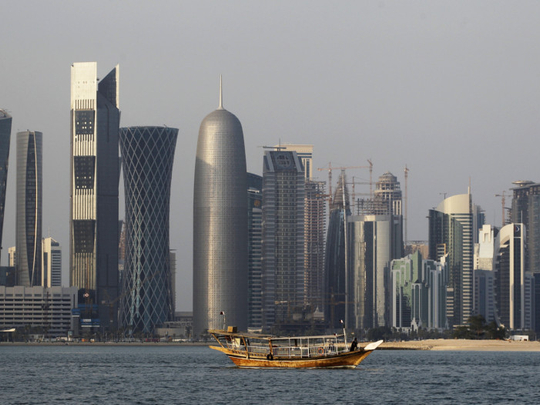
Journalists, analysts and pundits are just picking up on any slight gesture in an official statement or even a quote from a “well-connected expert” to see a resolution window to Qatar crisis — the boycott of Arab countries as a result of Qatar’s support of extremism and terrorism.
Though there might be a ‘softening’ of some sort in public statements, or a perception of softening to be accurate, I don’t think this crisis is coming to an end soon. It’s not just a gut-feeling or abstract conclusion.
It’s rather a view supported by principles of geopolitics, taking into account the developments in international relations since late eighties of last century.
And here’s why the Qatar crisis is here to stay for some time to come, whatever the developments.
READ MORE:
Qatar and the 'money diplomacy strategy'
Outlook looks grim for Qatar’s banking sector
UAE: Changes to Qatar anti-terror law positive
Qatar-linked individuals, groups involved in terrorism
Qatar’s lack of responsibility, accountability criticised
More revelations of Qatar’s plots in Libya
Al Jazeera: How it incites terror, hatred
Crisis: Qatar fails to grasp the reality
Poem urges Qatar to 'return to GCC'
First, and probably most important, Qatar would find it difficult to change course or make genuine alterations to its foreign policy.
Regardless of the argument about sovereignty and independent position, the choices made by Qatar look somehow irreversible. Since the mid-nineties, Doha used to claim fear from ‘mighty neighbours’ seeking to subjugate it.
It was just a pretext to embark on an approach Doha thought is the best for it to play a role beyond its geography and history. By the end of the bipolar world and the start of a process to have a ‘new world order’, there was a notion that coming era will be the age of Groups not States.
That galvanised a relationship between Qatar and the Group of Muslim Brotherhood (MB) — or Ikhwan — that extended to its off-shoots ranging from Abu Sayyaf militants in Philippines to the League of British Muslims in UK.
At the same time, Qatar is using its ties to these groups to bolster its position as a state — in GCC, Arab League and even internationally.
Group politics
At the start of July, The Straits Times published an interesting article by Kishore Mahbubani – the dean of the Lee Kuan Yew School of Public Policy at the National University of Singapore – emphasising an “eternal rule of geopolitics: small states must behave like small states”.
Though he was commenting on Qatar crisis, he’d in mind the experience of his country and was trying to draw a lesson for Singaporean foreign policy.
Whenever I heard Qatar’s former foreign minister, and later its prime minister, Shaikh Hamad Bin Jasem Bin Jaber Al Thani saying in his interviews “we’re a small country …” I expected a Qatari involvement that includes groups against states — in almost all instances my guesses came true.
That involvement in ‘group politics’ rather than ‘state politics’ deepened to an extent making it almost impossible for Doha to disengage from extremist and terrorist groups.
It’s true what officials from the boycotting countries are saying that solution of current crisis is in Qatar’s hands, but it might be equally true that it became not within hand.
Whatever the wealth it accumulated, Qatar as a state was a “small state”, but with its ties to those groups wreaking havoc not only in the region but all over the globe it got the feeling of “big state” that super and regional powers talk to negotiate issues involving such groups.
Qatar became the "state of groups".
Asking Qatar now to disengage from these ties is like asking it to throw away all its cards — regardless of what you think of these cards and how dangerous they’re even for Qatar itself.
This is not a disillusioned young person indoctrinated by a militant preacher to turn into a terrorist, rather it’s a conscious choice by a sovereign country. So, it’s really difficult to rehabilitate such a country after getting it out of this ‘maverick’ status.
A first step would mean that Doha admits its wrongdoing i.e. interfering in internal affairs of ‘brethren’ countries. I don’t think Qatar is ready to do this, not only out of stubbornness but as this would mean being confined to its real geopolitical status: “small state”.
Like in similar crisis before between Qatar and its neighbours or Arab ‘brothers’, Doha is betting on time: stick to your position, manoeuvre a bit, go into lengthy negotiations and nod to compromises ignoring them later.
I think the adversaries learnt a lesson about time; “let it drag on as long as it takes and we’ll see who gives up first”. This time, Gulf and Arab countries are not in a rush and are playing it differently: this is our issue, and it better be sorted out our way. Despite bold reassuring statements by Qatari officials, economic pains are biting just two months into the crisis and giving an indication of the consequences in a year or more. I think the four countries are not going to allow this ‘time’ factor to be used by Doha, and thus it’s going to be long before we see any change.
Dr Ahmad Mustafa is an Abu Dhabi-based journalist.









